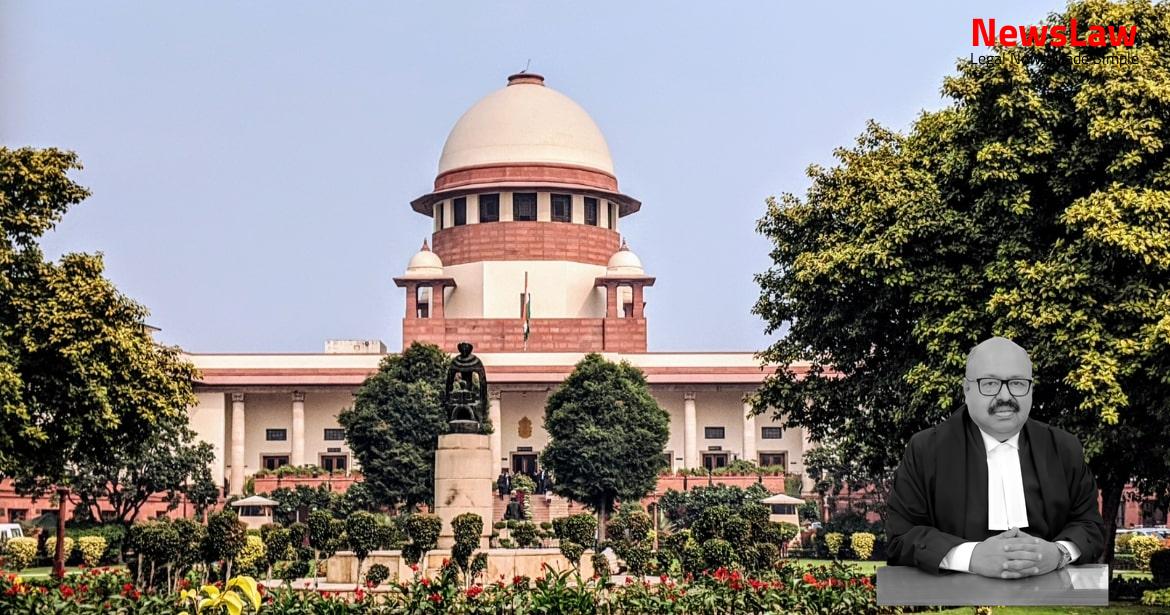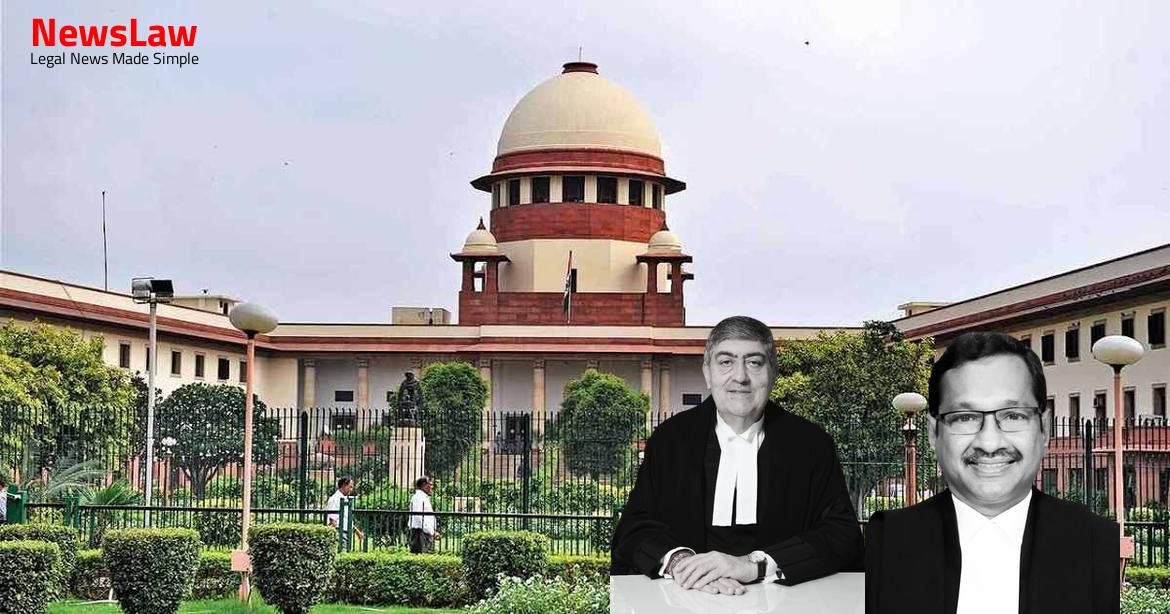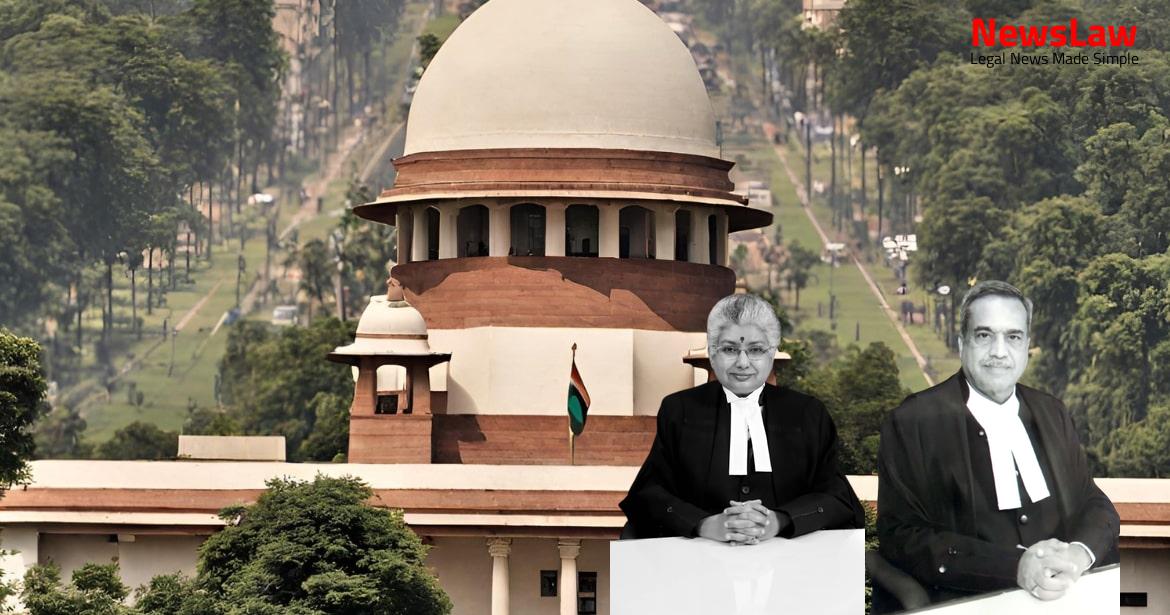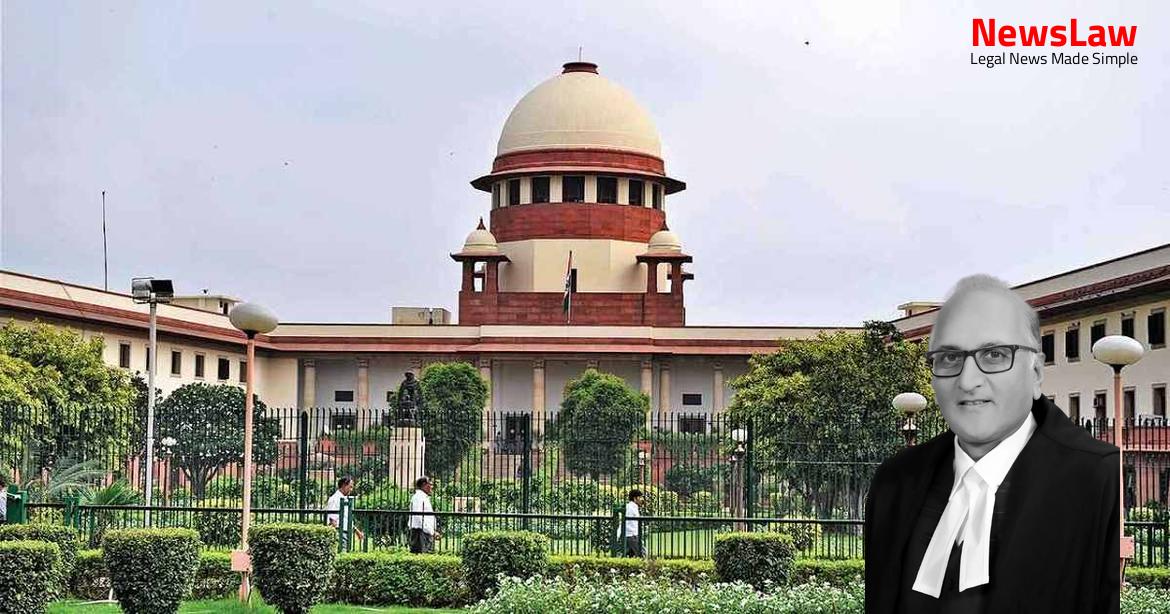Explore the intricate legal analysis undertaken by the court in a contentious case revolving around property rights and partition. The court meticulously examined agreements and wills to determine the rightful distribution of assets, leading to a decisive final decree. Discover the nuances of the legal battle and the implications for all involved parties.
Facts
- The plaintiff-appellant filed a suit for partition and related reliefs in the Court of Subordinate Judge, Narasaraopet, Guntur District, Andhra Pradesh.
- Defendants 2 and 3 admitted the suit, while defendant 4 was accused of misconduct after the death of Annapurnamma.
- Two separate appeals were filed – AS No 1887 of 1998 by defendants 16 to 18 claiming under an alleged agreement, and AS No 1433 of 1989 by defendants 4, 13, and 14 claiming under a Will.
- Plaintiff alleged that defendant 4 created differences amongst the siblings and obtained the mediation agreement fraudulently, leading to the suit for partition.
- Various allegations and denials were made regarding property dealings and agreements, such as an agreement for sale dated 05.11.1976 and a Will dated 15.06.1978.
- Defendant 2 and others were involved in the property disputes, as detailed in the plaint schedules A and B.
- The High Court judgments and decrees for the appeals were highlighted, revealing the complex legal battle over the properties left by Annapurnamma.
- The plaintiff asserted her entitlement to a one-fourth share of the properties, while defendants 1 to 3 claimed the remaining three-fourth share.
- The plaintiff and her siblings were embroiled in a dispute with defendant 4 and others regarding the property ownership and partition.
- Allegations of fraudulent conduct, unfair mediations, and property leases were central to the case, leading to multiple legal battles and appeals.
- The High Court upheld the validity of the agreement for sale dated 05.11.1976 (Ex. B-10) despite suspicions surrounding it.
- Defendants 1 to 3 were obligated to execute the sale deed in favor of defendants 16 to 18 per the agreement.
- The High Court found DW-8’s testimonies unconvincing and held Ex. B-10 as enforceable based on cogent evidence.
- The Will dated 15.06.1978 (Ex. B-9) was deemed invalid and not binding on the involved parties.
- The Trial Court issued a preliminary decree for the partition of specified properties.
- The Trial Court also found that the sale agreement (Ex. B-10) was likely fabricated to prevent the heirs from claiming the property.
- Cist receipts presented post-suit and altered documents like Ex. B-11 were deemed unreliable by the Trial Court.
- The High Court modified the Trial Court’s decree by excluding Item No 1 of the plaint A Schedule from the partition.
- Defendants 13, 14, and 16 were held responsible for mesne profits until they handed over possession of Annapurnamma’s properties to the plaintiffs.
- Defendants 5 and 6 were deemed non-essential parties by the Trial Court as they were former lessees who had vacated the property.
- The High Court concluded that the Will (Ex. B-9) was not the genuine last testament of Annapurnamma, while also criticizing the fabricated aspects of the sale agreement (Ex. B-10).
Also Read: Supreme Court Judgment on Single Till Mechanism for HRAB Calculation: A Comprehensive Analysis
Issue
- Whether the suit for partition filed by the plaintiff-appellant was not maintainable for want of relief of declaration against the agreement for sale dated 05.11.1976 (Ex. B-10)
- What is the effect and consequence of the fact that the legal representatives of defendant 2, who expired during the pendency of appeal in the High Court, have not been brought on record
- Whether the High Court was justified in reversing the findings of the Trial Court in relation to the agreement for sale dated 05.11.1976 (Ex. B-10)
Arguments
- The contesting defendant alleged that the plaintiff and defendants 1 to 3 were aware of the sale of the property in question to Malempati Satyanarayanavara Prasad and the execution of a Will by Annapurnamma bequeathing her properties to her mother and defendant 13.
- The contesting defendant denied the plaintiff’s claims regarding the execution of an agreement in favor of defendant 15 and the direction to execute a sale deed.
- The defendant 4 also denied other plaint averments concerning alleged mediators and maintained that no agreement was executed in their favor.
- The contesting defendant asserted that Annapurnamma was not on good terms with the plaintiff and defendants 1 to 3, and she was more attached to her mother.
- It was further asserted that Annapurnamma disposed of some properties to meet her necessities and was incurring losses in agriculture.
- Learned counsel for the appellant argued that the High Court failed to consider the fact that the beneficiaries under the questioned documents were close relatives of defendant 4, who suggested the existence of a will which was found invalid by the Trial Court and High Court.
- The counsel contended that the findings against the validity of the will extend to the alleged sale agreement, and the Trial Court’s findings on the falsity of the agreement called for no interference.
- Counsel for respondents argued that the suit for partition was not maintainable as the appellant did not seek a declaration regarding the agreement in question.
- It was contended that the High Court erred in not considering why the alleged purchaser did not register the sale deed despite paying a major part of the consideration.
- Arguments were made in favor of the validity of agreement Ex. B-10, highlighting its execution on stamp paper, payment of consideration, delivery of possession, and Annapurnamma’s need for money.
- The Trial Court’s decision on the agreement was said to be based on conjectures and surmises, which the High Court rightly reversed after considering the evidence.
- The competency of the appeal filed by defendants 16 to 18 in the High Court was questioned due to lack of substitution for the expired defendant 2, leading to arguments on the maintainability of the suit for partition.
- The plaintiff’s counsel argued that the High Court erred in reversing the Trial Court’s findings on the agreement without proper consideration.
- The plaintiff’s position against the validity of the agreement was highlighted by reference to pleadings and cist receipts.
- It was suggested that if the sale agreement was deemed invalid, the plaintiff should have sought a declaration in the suit for partition.
Also Read: Selection and Appointment of Judicial Officers in Himachal Pradesh
Analysis
- The death of a plaintiff or defendant shall not cause the suit to abate if the right to sue survives.
- Procedure to be followed when one of several plaintiffs or defendants dies and the right to sue survives.
- The Court shall cause an entry to be made on the record when there are multiple plaintiffs or defendants and one of them dies.
- Legal representative of the deceased defendant must be made a party if the right to sue survives against the surviving defendant(s) alone.
- If no application is made within the specified time, the suit shall abate against the deceased defendant.
- In cases where plaintiffs, appellants, petitioners, defendants, or respondents have distinct, separate, and independent rights but are joined together for convenience in one litigation, the decree should be considered as a combination of several decrees in favor of one or the other parties.
- This principle also applies when different and distinct claims of multiple parties are clubbed together and dealt with in a single proceeding under the Land Acquisition Act or similar proceedings.
- In situations where legal representatives of a deceased party are not present, the appellate court cannot determine anything that may affect the rights of the legal representatives under the decree.
- It is relevant to consider the Constitution Bench decision in the case of Sardar Amarjit Singh Kalra (dead) by LRs. and Ors. v. Pramod Gupta (Smt) (dead) by LRs. and Ors. (2003) 3 SCC 272, which involved different proprietors with different claims who joined together in appeals against orders in reference proceedings.
- The Trial Court correctly deemed the agreement for sale (Ex. B-10) invalid and untrustworthy, similar to the Will (Ex. B-9).
- The Trial Court’s findings were based on proper analysis and sound reasoning, warranting no interference.
- The High Court erred in intervening with the Trial Court’s findings on the agreement in question.
Decision
- Court fee to be paid by defendants 4, 13, 14, 16-18
- Not binding on plaintiff or defendants 1-3
- Appeal suit by defendants 16-18 allowed with costs
- Plaintiff entitled to costs of the suit from defendants 4, 13, 14, 16-18
- Property in dispute not available for partition
- Mesne profits to be ascertained through a separate petition
- Appeal succeeds and appeal by defendants 16-18 in the High Court dismissed
- Plaintiff entitled to costs of litigation in High Court and this Court from contesting respondents
- Costs to be partitioned into four equal shares and plaintiff to be put in possession of one share
- Defendants 1-3 bound by the decree and under obligation to execute sale deed in favor of defendants 16-18
- Decree of the Trial Court stands restored
Case Title: VENIGALLA KOTESWARAMMA Vs. MALEMPATI SURYAMBA . (2021 INSC 27)
Case Number: C.A. No.-009546-009546 / 2013



